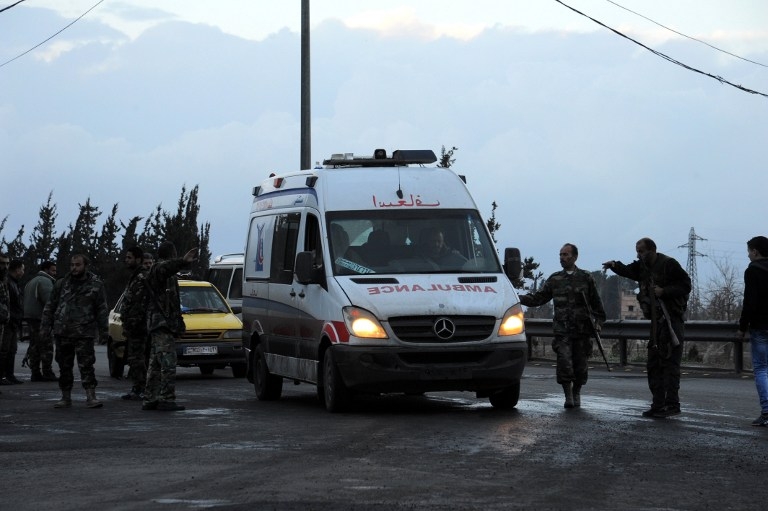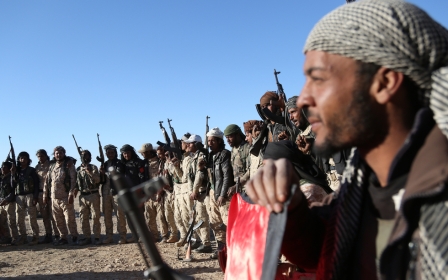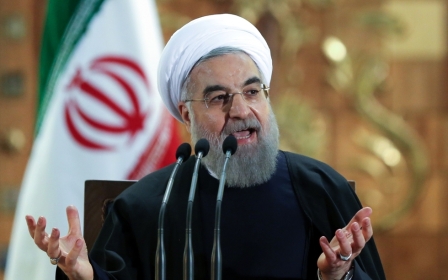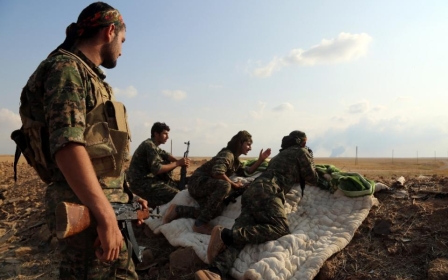Damascus shrine attack 'deadliest of entire Syrian war': Monitor

The death toll from Sunday's string of suicide bombings in a Damascus suburb rose to at least 120 people on Monday, a monitoring group said, calling it the deadliest attack of Syria's near-five-year war.
The UK-based Syrian Observatory for Human Rights said that at least 90 civilians were killed in the attacks near the Shia shrine of Sayyida Zeinab, which were claimed by the lslamic State (IS) group.
The rest of the dead were members of pro-government security forces, the Observatory said.
The Observatory also reported that two car bombs killed at least 64 people and wounded dozens in the pro-government district of Zahraa in the central city of Homs. IS also claimed responsibility for those attacks.
The latest bombings in government-controlled territory come with the Syrian army and its allies waging an offensive backed by Russian air strikes in the north of the country, and with the US engaged in talks with Moscow in an attempt to secure a ceasefire deal that might lead to the resumption of multi-sided negotiations aimed at securing a permanent peace.
The former Syrian Prime Minister, Riyadh Hijab, said on Monday afternoon that there was "preliminary agreement" on a temporary ceasefire, which Western diplomatic sources told Sky News Arabia was scheduled to begin on 27 February.
Details of what the ceasefire deal would involve have not yet been made public.
US Secretary of State John Kerry had said on Sunday that a provisional deal was in place and that a cessation of hostilities could begin "in the coming days" following talks with Russian counterpart Sergei Lavrov.
He said US President Barack Obama would speak to Russian President Vladimir Putin "in the next days or so" to discuss the implementation of the deal.
The Russian foreign ministry later said Lavrov and Kerry held two more telephone conversations and finalised the ceasefire terms to be submitted to their respective presidents, although neither side has released any details of the proposed deal.
But neither IS, nor the al-Qaeda-affiliated Nusra Front, would be party to any ceasefire under discussion as both are considered terrorist organisations by the UN Security Council.
Russia's foreign ministry said on Monday that the bombings were an attempt to undermine peace efforts.
"The atrocious crimes of extremists are aimed at scaring the peaceful population, subverting attempts to reach a long term political settlement to the Syrian crisis in the interests of all Syrians and efforts to end violence and bloodshed," it said in a statement.
Sunday's IS attacks follows on from several car bombings also claimed by the group in Syria's capital lately, including an attack on 1 February that killed 71 people, also near the Sayyida Zeinab shrine.
"They are starting to adapt to the new situation," Thomas Pierret, a lecturer in contemporary Islam at the University of Edinburgh, said of IS at an All-Party Parliamentary Group on Friends of Syria meeting earlier this month.
As other Syrian opposition groups face the Syrian government's Russian-back offensive in Aleppo and elsewhere, IS is "preparing to win the hearts and minds" of Syria's Sunni majority, Pierret said.
Although most Syrian Sunnis "despise" IS, he said, "they don't really complain that IS is bombing police stations in Damascus".
Russia has pledged to continue backing Syrian President Bashar al-Assad in his fight against "terrorists", while Kerry has stated that Assad must step down as a step towards a lasting peace deal.
World powers proposed a truce just over a week ago as part of a plan that also included expanded humanitarian access, in a bid to pave the way for peace talks to resume.
The talks, which collapsed earlier this month in Geneva, had been scheduled to resume on 25 February, but the UN's Syria envoy has already acknowledged that date is no longer realistic.
Syria's main opposition umbrella group, the High Negotiations Committee (HNC), was meeting in the Saudi capital Riyadh on Monday for talks on the ceasefire efforts.
HNC chief Riad Hijab said any ceasefire must be reached "with international mediation and with guarantees obliging Russia, Iran and their sectarian militias and mercenaries to stop fighting".
Zahraa residents blame governor
Sunday's attacks in Damascus were the second time the area near the Sayyida Zeinab shrine has been targeted this year, following an attack also claimed by IS that killed at least 70 people.
The blasts struck about 400 metres from the Shia shrine containing the grave of a granddaughter of the Prophet Mohammed.
IS said online that two suicide bombers struck in Sayyida Zeinab and two others drove explosive-packed cars into crowds in Homs.
UN special envoy for Syria Staffan de Mistura "strongly condemns" the attacks, his spokesperson said in a statement.
State television footage from Homs showed emergency workers carrying a charred body on a stretcher past devastated shops and mangled cars and minibuses.
Zahraa, whose residents are mostly from the same Alawite sect of Shia Islam as Syria's ruling clan and is considered a stronghold of support for the government, has been regularly targeted and was held under siege by rebel groups until government forces advanced earlier this month.
In the wake of the bombing, footage from Zahraa showed residents crowding around the governor of Homs, Talal al-Barazi, when he visited the scene of the blast.
Residents are shown screaming at Barazi, holding him and local security forces responsible for the blast and the high number of casualties.
Once dubbed the "capital of the revolution," Homs city is now largely controlled by the government, with the exception of the Waer district, which is being gradually turned over to the government under a deal with opposition fighters.
Government advance
Meanwhile, government forces backed by Russian strikes were advancing on Sunday east of Aleppo city against IS, consolidating their control over a stretch of highway from the city to the Kweiris military base.
The Observatory said at least 50 IS fighters had been killed in clashes and Russian strikes since Saturday morning.
But their efforts to retake Aleppo city, where rebels continue to hold eastern areas of the city, appeared to suffer a setback on Monday with the Observatory suggesting that militants had cut a supply route into the government-held west of the city.
The road between Aleppo and the town of Khanasser to the southeast was the only way government forces and civilians living in government-controlled neighbourhoods of the city could travel to surrounding provinces.
Tensions have been rising between Moscow and opposition-backer Turkey, alarmed by both the government's Russian-backed advances and a major operation by Kurdish-led forces in Aleppo province.
The Kurdish People's Protection Units (YPG) and their Arab partners, including Jaish al-Thuwwar, have seized key territory from rebel forces in Aleppo province, prompting Turkey to shell their positions.
Ankara considers the YPG to be an affiliate of the outlawed Kurdistan Workers' Party (PKK), which has waged a decades-long insurgency against Turkey.
It fears the Kurdish advances are intended to link areas in north and northeast Syria to create a contiguous semi-autonomous Kurdish zone along the Syrian-Turkish border.
On Sunday, Turkish President Recep Tayyip Erdogan defended his country's fight against the YPG as "legitimate defence" after international calls for Ankara to halt its military action in Syria.
New MEE newsletter: Jerusalem Dispatch
Sign up to get the latest insights and analysis on Israel-Palestine, alongside Turkey Unpacked and other MEE newsletters
Middle East Eye delivers independent and unrivalled coverage and analysis of the Middle East, North Africa and beyond. To learn more about republishing this content and the associated fees, please fill out this form. More about MEE can be found here.




